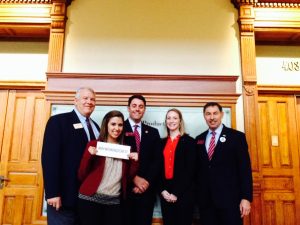Forestry Day at the Capitol a Success

Georgia Forestry Association members swarmed the halls of the Capitol on Wed., Feb 3, to meet with their respective House and Senate members.
As the Association did not need a strong push on any specific legislation, members focused on building relationships. The #MyWorkingForest photo contest generated more than 150 pictures of members with their elected officials, making a mark on the Capitol as GFA members had fun breaking new ground in this first-of-its-kind activity at the Capitol. Click here to view the full album →
Today marks legislative day 16, and as expected, the volume of legislation working its way through both chambers has been light as compared to prior years. Here is a brief update on issues of importance to the forestry community.
Forestry Focus
Georgia Agricultural Tax Exemption (GATE) Program Changes | House Bill 911
The GATE program was established in 2014 to streamline the sales tax exemptions that are granted to the agriculture and forestry industry. Unfortunately, the program has suffered from the abuses of a small group of bad actors at the retail and consumer level who have taken advantage of the program in ways that were never intended.
In its current state, HB 911, sponsored by Rep. Geoff Duncan (R-Cumming), would raise the annual income requirement from $2,500 to $10,000. In addition, the legislation would transfer the administrative responsibly from the Georgia Department of Agriculture to the Georgia Department of Revenue.
Haul Weights | House Bill 411
HB 411, sponsored by Rep. Sam Watson (R-Moultrie), addresses the competitive disadvantage that Georgia has compared to neighboring states when hauling unfinished wood products. The provisions of the bill would set the allowable weight at 84,000 lbs. with a 5 percent variance, allowing weights of 88,200 lbs. without penalty. The bill would also require haulers to purchase a permit of $250 per vehicle per year from the Georgia Department of Transportation.
The Association has been supporting this legislation by gathering information to understand the impact on safety, logistics and roads. As the window of time to introduce legislation continues to shorten, the Association continues to engage with key stakeholders and legislators to provide information to support passage of this bill.
Solar Panels on Covenanted Land | House Bill 496
HB 496, sponsored by Rep. Matt Hatchett (R-Dublin), would allow property where solar energy is generated to be removed from an existing covenant (such as the Conservation Use Valuation Assessment (CUVA) or the Forest Land Protection Act (FLPA)) without penalty. After the property is removed, it would be subject to property taxation at fair market value.
HB 496 is currently assigned to a Senate Finance subcommittee chaired by Sen. Bill Heath (R-Bremen), who expressed opposition to the bill in 2015.
Farm Vehicle Use | House Bill 579
HB 579, sponsored by House Agriculture Committee Chairman Tom McCall (R-Elberton), would allow anyone 16 or older to move farm use vehicles (AVTs, golf carts, etc.) on public roads for “agricultural or forestry pursuits” – such as driving from piece of property to another – provided that a “low speed vehicle” emblem is displayed. Because some counties have increased restrictions on the use of such vehicles on public roads, this bill could greatly benefit foresters and landowners who are moving from one tract to another via public road.
Sales Tax Exemption on R&D Equipment | House Bill 415
An initiative of the Georgia Association of Manufacturers, HB 415 would exempt from the sales and use tax machinery and equipment used in research and development. An inaccurate fiscal note held the bill up last year, but Ways & Means Chairman Jay Powell has asked the Department of Revenue to re-visit the potential fiscal impact of this proposed exemption.
Medical Marijuana | House Bill 722
Following on the heels of last year’s bill legalizing medical marijuana, HB 722, sponsored by Rep. Allen Peak (R-Macon), is primarily aimed at providing for a system of growing the plants and manufacturing medical cannabis. As introduced, however, HB 722 also has implications for workplace safety, workers compensation, and drug testing programs. It would also provide that “…an employer shall not discriminate against a person in hiring, termination, or any term or condition of employment, or otherwise penalize a person…” because they are “a patient enrolled in the registry program.” This would diminish Georgia’s strong “employment-at-will” policy by creating a new “affected class.” Currently the only affected classes in Georgia are those prescribed by the federal government – age, gender, race, religion, and national origin.
The House Judiciary Non-Civil Committee is scheduled to consider a substitute version of HB 722 on Monday. It is not yet clear whether the substitute will contain troublesome provisions related to employment. [Source: Georgia Paper & Forest Products Association]
Property Value During the Appeal Process | Senate Bill 258
SB 258, sponsored by Rep. Fran Millar (R-Atlanta), would not allow the assessed value of property to be increased beyond the initial assessed value established by the board of tax assessors during an appeal by the taxpayer in such taxable year, but may be reduced as a result of the appeal by the taxpayer. The bill has been referred to Senate Finance Committee. [Source: Georgia Paper & Forest Products Association]
Capitol Forestry Reports are distributed weekly during the session of the Georgia General Assembly. Click here to view the full report from week four →

